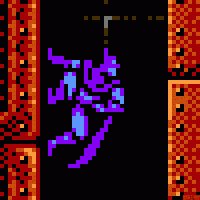If there's one thing I can't stand in a game, it's faff. And deckbuilders tend to have more than their fair share. But Undaunted: Normandy makes it easy. A few double-sided squares to build a board, a few soldier cards to make your deck and you're done. Between the two of us, it takes moments, seeming too good to be true.
And we're off, feeling our way like brave explorers in a brave new world. The first scenario is about controlling objectives. But most units can't move into a square until a scout unit has recced it with a Scout card. Naturally, I have none in my opening hand, only a Leader and a Rifleman. So I play the leader which lets me add cards to my deck - I choose a Scout - and take some ineffectual shots with the Rifleman.
My opponent has more luck and begins to Scout. Doing so, though, adds useless Fog of War cards to his deck. Another use of a Scout card is to remove these but, over these tentative turns, their accumulation bedevils our hands. Soon, the game bogs down into a static firefight. Combat, like everything in Undaunted: Normandy is simple. Each tile has a cover value and you add that, plus the range, to the target's defence number, then roll the total or more on a d10. A hit removes a card of the matching type from the enemy deck.
We're dug down in good cover squares, shooting away, trying to clear a path to those objectives. All we're doing is drawing cards and rolling dice, but the hope inherent in every action is like a drug. Drawing and cursing. Rolling and cheering. Neither of us cares that nothing is moving. How long can the game sustain us in this camouflage?
As it begins to waver, my mind begins to wander. I ponder why there are no rules for suppression or retreat. Then, as I take a hit and discard a card out of the game, the brilliance of Undaunted: Normandy, crashes down on me like a wave. The number of cards in my deck *is* suppression and retreat. The more I remove as casualties, the less the corresponding counter on the board can do.
So I start to work the numbers, using Leaders to bolster my deck, protecting me from fire. It works. I quickly manage to push the Germans back. Then I creep forward, capturing the last objective I need. The whole concept of the game has taken my breath away. But the static nature of that first scenario is undeniably weak, and it takes more than a breathtaking concept to make a game.
There is no question but that we're doing this again. A bit more sorting of cards and tiles and we're on to scenario two. This introduces machine-gun teams on the German side which have big attack dice. They also have a Suppression ability which is an attack with more dice that disables the target for its next play, rather than removing its card.
It proves an almost unassailable asset. My task is to move my US forces to capture objectives on the far side of the board. The weight of fire and the weight of luck on the German dice is so huge that it's soon over. I can't work out what I've done wrong so I ask for a rematch.
This time, I try to puzzle through the strategic options. Might hanging back or splitting my forces work? I think not. So instead I use my Scouts for something different. One of their options is to add Fog of War to the enemy deck in a neat simulation of deception operations.
For a few tight turns, it feels like this might work. But then the Germans regain the initiative. They have only one squad rather than two in this scenario which hands them an unexpected advantage. If I have an alpha squad rifleman poised to take an objective and draw a hand full of bravo squad cards, he's a sitting duck. Undaunted's deck doesn't just brilliantly abstract away firefights but command confusion too, with zero added rules.
My opponent is turned off by the apparently one-sided nature of this scenario. So we put the game away. Later, I get out the scenario book and look, longingly at the setup, trying to work out a solution on the board or in the deck. My brain decides to work on it as I sleep since, during my morning shower, a possible solution hits me. It feels like my slower deck is a disadvantage but what if I leverage my extra squad, using weight of numbers to slowly thin his smaller card pool?
Half of me it so absorbed by this that I want to try again and see if it works, see if there's a German counterpoint to work against it. The other half wants to try the other eleven scenarios in the book. That part wins. So I take it to a friend's house to play the third scenario. This involves a river, and for the first time, the sheer simplicity of Undaunted: Normandy disappoints. There are no special terrain effects for the water: it's mere decoration and it feels wrong.
And it turns out that third time's the charm. This scenario is as dynamic and open as the first two felt closed and static. Objectives dot the river and the board corners. My soldiers quickly secure enough to launch a winning bid, but I have a long way to go to reach the final ones I need. The German player adds machine guns to his deck and lays down a murderous suppressing fire. I'm trapped, one square from victory, pinned in a space with no cover.
He begins to inch up the river, adding to his tally and threatening my existing gains. At first, I'm adding Riflemen to my deck to try and get the impetus to unsuppress and move for that final point. But as he gathers momentum, I switch tactics. I add some machine gunners myself and set up a base of fire in a covered hex. It works. His own units are quickly suppressed. But I don't have the firepower to convert it into casualties.
We're grinding out inches here, working on the smallest margins. Then, all of a sudden, I have a winning hand. I've got the cards to capture that last objective. If I go first, I could. But turn order gets determined through the blind play of a card, highest value wins. My other two cards are Fog of War, and the German wins the ties. I have to risk it and let him go first, hoping he doesn't have the one machine gun I know he has left in his deck to suppress me.
Nightmare. Not only does he have it, but he's got the cards to push and flip his last objective and steal the win. I feel energised, thrilled by the closeness of the game. But he's disappointed it came down to random card draw, left cold by the military theme. I'm reminded that not everyone finds it so easy to separate toy soldiers from real ones.
Starved of opponents, I take to soloing the game. This is awkward, given the first-turn bid, but not impossible since most players use it as an excuse to ditch Fog of War cards. The next couple of scenarios introduce new units. The hard to kill sniper and the lethal mortar, which needs separate actions to setup and attack. The richness, depth and realism these add for almost no rules overhead are quite incredible.
Poring over cards, alone, there's nothing left but to ponder why a game this good has so few takers in my circle of friends. I asked them but got no clear responses. But second-guessing the answer, I think, is the theme.
Some gamers will slaughter a million goblins but turn away at a drop of human blood. Some will slaughter a million soldiers, but only with a million rules to make it a historical simulation. Undaunted: Normandy, proudly militaristic but without a single line of sight rule, falls deep into the wide valley between these two. It would be a shame if this game, brimming with smart design and excitement, got overlooked down there.
 Games
Games How to resolve AdBlock issue?
How to resolve AdBlock issue? 
























